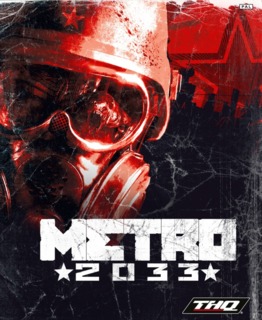Not the blockbuster AAA experience, but an experience nonetheless.
Of course, the smaller the ambition, the smaller the game, and thus the smaller the returns. S.T.A.L.K.E.R: Shadow of Chernobyl combined the open-ended nature of western RPGs with first person survival shooter combat to critical acclaim. Metro 2033 attempts a slight variation of that on a much smaller scale. It's not to say that Metro 2033 is inherently the lesser game; it deserves every bit of attention as the S.T.A.L.K.E.R games have received, and should not be missed by any PC FPS aficionado. Though they are of the same ilk, their directions and aspirations are different enough to co-exist peacefully. However, one cannot but help realize that S.T.A.L.K.E.R was the much grander achievement, and its earlier release will dampen the impact Metro 2033 will make. But enough of the comparisons, onto the game itself.
Metro 2033 is one of a select few titles that are primarily atmosphere-driven as opposed to story-driven or gameplay-driven. That is to say, atmosphere appears to take precedence over anything else. To illustrate, you'll perhaps be less interested in the severe details of protagonist Artyom's journey from one end of Moscow's metro system to the other in search of enlisting help by the revered "Rangers", but you'll definitely feel the comfort of each fortified metro station you come across, as opposed to the ridiculously foreboding atmosphere of everywhere else. The tight hold atmosphere has also permeates into the gameplay space. Metro 2033, as a shooter, has mediocre gunplay. The weapons don't feel powerful, feel too clunky, and given the enemies and situations you sometimes come across, they don't appear to function logically. But it seems to work in tandem with the atmosphere as you frantically fire on your unfairly resilient enemies, reloading several magazines just to take one down, your flashlight is getting dimmer and the setting just feels downright evil. It probably would not work if you could pull off head shots like no tomorrow and down enemies in seconds considering the context, but the fact remains if it was any other game it would get docked for points.
The game's weak gunplay can also be forgiven because the game itself isn't primarily a shooter. If anything, it's a survival horror; ammo is always scarce, the flashlight battery is always recharging, and more often than not, you should avoid conflict as you're usually outnumbered and outgunned. Creepy mutant monsters and greedily-equipped mercenaries compromise the bulk of the enemies throughout the game. Oftentimes the locations have unbreathable air, and so a gas mask with replaceable air filters is needed. It's rather claustrophobic running around in a gas mask, with the noise distorted and your vision not as clear, though it is usually fine if you're exploring. However, combat can get frantically disorientating, especially when the gas mask is able to crack and obscures your vision. You can replenish your supplies by finding items in the remnants of battles long finished in the tunnels, or the station safe-havens, where you can buy and upgrade your weapons to make it that much easier to survive.
The currency in the game is gun ammo. The closest thing to money are gun cartridges that were made before the nuclear war, which are high quality and highly prized. You can use high quality ammo to directly buy upgrades for your weapons, or use it to eliminate enemies much faster. Both options are lucrative, and makes the game that much more challenging. Weapon upgrades (or downgrades) also bring trade-offs: you can upgrade a weapon to have more stopping power or come equipped with a silencer so you can take down enemies without alerting other hostiles to your presence. You can also revert back to more basic weaponry if you want to keep some high quality ammo.
Metro 2033's greatest advantage is that there are very few games like it, as very few games dare to be that different. Boring gunplay and terrible A.I can do terrible damage to a first person shooter, but with interesting survival horror aspects, fantastic art direction, great sound, and pixel-pumping technology, Metro 2033 comes together as an engaging yet frustrating experience that you won't forget anytime soon.

